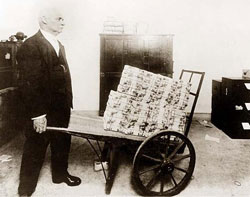Guide to Incoming Shifting and Section 660
 Income shifting is a term used to describe where people distribute their income earned via a limited company or partnership to another person - usually a partner - to save tax. The Government is bringing in new laws to stop people doing this. Income shifting legislation hasn’t become law yet but the legislation is pending. It was supposed to be introduced in April 2008 but it was delayed so the impact on small family businesses could be assessed properly. It was then planned to be bolted on to the 2009 Finance Bill but latest news is that it won't become law until 2010.
Income shifting is a term used to describe where people distribute their income earned via a limited company or partnership to another person - usually a partner - to save tax. The Government is bringing in new laws to stop people doing this. Income shifting legislation hasn’t become law yet but the legislation is pending. It was supposed to be introduced in April 2008 but it was delayed so the impact on small family businesses could be assessed properly. It was then planned to be bolted on to the 2009 Finance Bill but latest news is that it won't become law until 2010. 
In recent years HMRC has been interpreting an old piece of settlement legislation - known as section 660A - essentially to achieve the same thing. For a while they were successful and there has been a drop in new businesses where husbands and wives split share ownership. Then HMRC's interpretation was put to the test. The most high profile Section 660 case Arctic Systems, went all the way to the House of Lords. Their interpretation was found to be insufficient and so it was necessary for Government to draft new legislation.
The New Rules in Income Shifting and Section 660
For years it’s been common for small businesses to introduce a second shareholder or partner; often a family member. There are sometimes perfectly genuine commercial reasons for joint ownership, but in the main it’s been about saving tax. In future, you won't be allowed to benefit from shifting income if the following four criteria are met:
- 1st Condition - Person 1 has authority to decide share structures.
- 2nd Condition - Person 1 gives up income to Person 2 for the tax year.
- 3rd Condition - Person 1 has the authority to decide on the amount shifted.
- 4th Condition – The shifted income is in the form of distributed profits.
There must also have been a tax advantage created by the shifting of person 1’s income. These conditions will be met in almost all cases, so HMRC would then assess the amount of income that they believe shifted from Person 1 to Person 2. The amount of income shifted (and taxable) would be based on the type and amount of work person 2 does; their responsibility for decision making and the amount of capital invested by this 2nd person. You may feel that you can show that your situation meets some of these criteria - say, if you have a personal service business and you borrow against your family home - HMRC indicate they will not consider these arguments sufficient. They will just assess any amount they believe was shifted against the main business fee earner.So you mustn't give share ownership to someone who's not the main fee earner without some serious consideration of the risks. If you plan to share ownership then you need written documentation to help defend your position later.
Income Shifting and Section 660 - Paying a Salary to a 2nd Person
Salary paid to an employee will be taxed under PAYE; income shifting rules won't apply. HMRC will expect this salary to be in keeping with the job; they’ll assess the market rate for hours and type of work, decision-making responsibilities, contribution to fee income, etc.
Conclusion on Income Shifting
Government is still assessing the impact on small family run businesses but personal service businesses that have one main fee earner will almost certainly be affected. Where there are genuine commercial reasons for splitting share ownership of a business it is essential to document the reasons for the decision and keep as evidence of working practices which would help defend against challenges. Without strong commercial reasons it would be risky for dividend income to be paid to anyone apart from the main fee earner.



